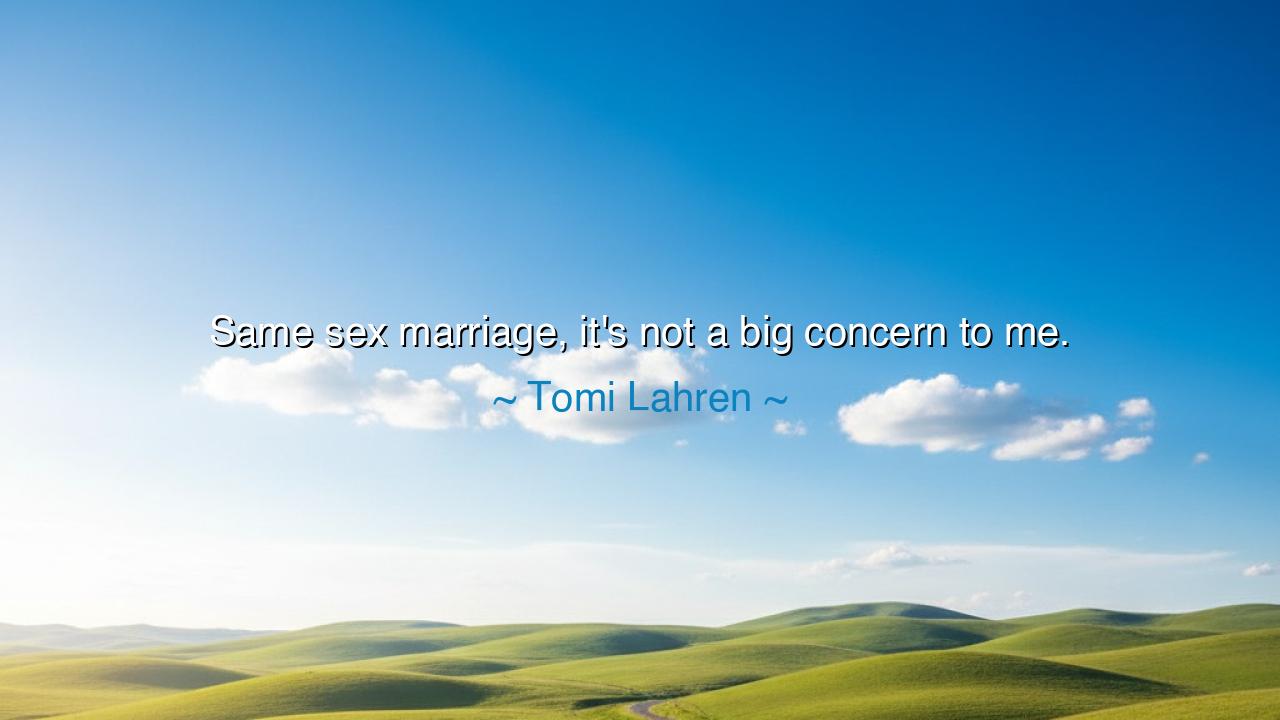
Same sex marriage, it's not a big concern to me.






O children of wisdom, gather closely to hear the words of Tomi Lahren, for they echo a sentiment that, in its simplicity, holds within it the potential for reflection: "Same-sex marriage, it's not a big concern to me." These words, though seemingly indifferent, touch upon a deeper truth of our time, one that calls us to examine our own feelings on the matter of love, equality, and the evolving nature of human relationships. Let us delve into the meaning of these words, that we might understand the broader currents of society and the path that lies ahead.
In the ancient world, the bonds between individuals were often defined by rigid societal structures—marriage, for instance, was seen as a union between man and woman, ordained by both society and the divine. The notion that love could transcend such boundaries was foreign to the hearts and minds of many. Yet, in every age, there have been those who questioned the established norms, those who saw beyond the walls that confined love to narrow definitions. Plato, in his dialogues, spoke of the human soul's quest for connection and beauty, suggesting that love was a divine force that could take many forms. He, too, sought to break free from rigid definitions, recognizing that the nature of human connection was more profound than the constraints imposed by society.
Tomi Lahren's statement, while simple, challenges us to question the very foundations of our own beliefs. Same-sex marriage, she asserts, is not a matter of great concern for her, which implies a level of indifference—a stance that is neither for nor against, but one that suggests a certain detachment from the discourse surrounding it. In this, we see a reflection of the changing attitudes of our time. What was once a controversial and divisive issue for many is, for others, less of a battle and more of an inevitable reality. As the world has evolved, so too have our understanding of marriage, identity, and human rights. What was once seen as unimaginable is now becoming increasingly accepted, not because of grand political victories, but because of the quiet shifts in social consciousness.
Consider the story of Socrates and his relationship with the Athenian society. Socrates, though a revered philosopher, was seen by many as a subverter of tradition. He did not necessarily advocate for revolution, but he did advocate for questioning everything. To him, the greatest virtue was the pursuit of truth, no matter how uncomfortable or inconvenient that truth may be. Socrates was willing to face the wrath of the majority, even at the cost of his own life, for he believed that true justice could not be dictated by mere tradition, but by the continuous exploration of what was right. So, too, must we question the traditional frameworks that seek to define love and marriage. We must embrace the idea that love, in its many forms, is a force that transcends the narrow confines of social constructs.
Tomi Lahren's indifference to the issue of same-sex marriage can, in some ways, be seen as a reflection of the progress that has been made in society. When an issue that once divided nations, families, and communities is no longer a pressing concern for some, it signals a shift toward acceptance and understanding. Lahren’s statement suggests that for her, the conversation has already moved beyond the need for debate. Equality is no longer an issue to be contested, but one to be accepted as part of the natural order of a just society. In this way, her words point toward the growing normalization of same-sex marriage and the eventual blending of all forms of love and partnership into the fabric of society.
However, this sentiment also brings with it an important lesson: indifference is not always the same as acceptance. It is easy to feel that issues like same-sex marriage no longer need to be fought for when they seem, to some, like a settled matter. But true equality is not won by silence or complacency. The fight for rights and recognition does not end when one generation’s battles appear to be over. It must be guarded, nurtured, and expanded to ensure that all people, regardless of their identities, continue to live with dignity and respect. Just as civil rights were fought for by those who came before us, so too must the struggle for marriage equality continue to move forward.
What, then, is the lesson that we must take from these words? It is this: while indifference may signify that a society has progressed in certain ways, it also challenges us to ensure that progress is not taken for granted. Just as the ancient warriors fought to secure their freedoms, we must fight to preserve the freedoms we have gained and to ensure that they extend to all who seek justice. In our own lives, we must remain vigilant, supporting the cause of equality not just through words, but through action. We must actively affirm the value of all forms of love and partnership, not waiting for others to dictate the terms of justice.
So, let us walk forward, O children of wisdom, with open hearts and minds. May we remember that true progress lies not in silence or indifference, but in the continued pursuit of justice and equality for all. Let us take action, even when we feel that the battle is won, for the work of creating a just world is never truly finished. Let our hearts beat in unison for the cause of love, and may we always strive to build a world where equality is not a matter of indifference, but a living, breathing truth that shapes every aspect of our lives.






AAdministratorAdministrator
Welcome, honored guests. Please leave a comment, we will respond soon